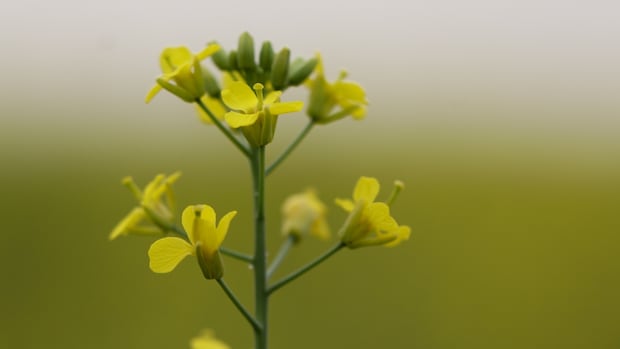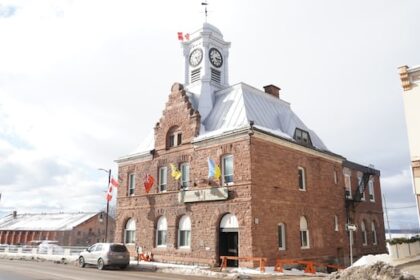Saskatchewan·This is SaskatchewanAs producers start to harvest this year’s canola crop, politicians are trying to figure out how to ensure they don’t lose money on their exports due to tariffs. Farmers and industry experts suggest biofuels might be a way to keep more domestic canola in Canada.Domestic renewable fuel production could make producers less reliant on exports, industry expert saysSam Maciag · CBC News · Posted: Aug 29, 2025 4:00 AM EDT | Last Updated: 6 hours agoAs farmers consider what they will do with this year’s canola crop, some producers and industry experts say diversification from a focus on exports needs to happen. (Cory Herperger/CBC/Radio-Canada)As Saskatchewan Premier Scott Moe plans a trade mission to China to address recent tariffs the country imposed on Canadian canola exports, some of those impacted are eyeing up homegrown solutions.Fred Ghatala, president of Advanced Biofuels Canada, said biofuels are a great way to make better domestic use of Canadian canola. Those fuels include biodiesel, renewable diesel and sustainable aviation fuel.”When you produce the fuels close to home, the economic value stays in the local economy. It’s one of the best solutions to lower emissions [and] increase economic activity, while really not requiring people to change the way they operate,” he said. The Canadian canola industry has been upended by international trade wars. On Aug. 14, China imposed a provisional duty rate of 75.8 per cent on canola seed, on top of the 100 per cent tariff levied on Canadian canola oil and meal in March.The new anti-dumping duty marked another escalation in the yearlong trade dispute that started when Canada imposed 100 per cent tariffs on Chinese-produced electric vehicles in August 2024.It’s a big deal for Canada — particularly for Saskatchewan. According to the Canola Council of Canada, growers produced 17.8 million metric tonnes of canola in 2024, with 55 per cent of that coming from Saskatchewan.China is Canada’s second-biggest canola export market behind the United States, to the tune of $4.9 billion last year. Right now, the fuel standard policies around using canola oil are different across the country, which means some provinces are using a lot more than others. Ghatala said he sees it as an opportunity and pointed to British Columbia as doing the best, with 31 per cent renewable content in its diesel. LISTEN | As Canola farms face a tariff crush, could biofuels be a path forward? Saskatchewan has a renewable fuel standard that requires at least two per cent of the diesel mix to be renewable. Right now, about 2.5 per cent of the mix is renewable. When it comes to renewables in gasoline, Saskatchewan is doing even better at nearly 10 per cent, surpassing the provincial goal of 7.5 per cent. Ghatala said the opportunities to use even more domestic canola oil would improve with access to biofuel refineries. But that takes investment — and he said investors need to know the government would support biofuel with policies that increase renewable fuel standard requirements.Ghatala said Canadian plants are also competing with imported fuel from the United States. In January, the clean fuel production credit replaced the bio-diesel blenders credit. It offers varying amounts of credits based on fuel types and emission reduction. The eligibility is limited to U.S.-produced fuels, meaning producers in the States can sell their products for cheaper.The change to a producer-based system essentially eliminated eligibility for Canadian biodiesel and renewable diesel in the U.S., which reduces demand for Canadian feedstock like canola oil. “We don’t have anything equivalent in Canada,” Ghatala said, adding he’d like to see a competitive playing field. In Canada, renewable diesel is being produced in B.C., Alberta and Newfoundland. Biodiesel is being produced in B.C., Alberta, Ontario and Quebec. Saskatchewan primarily provides canola feedstock that is turned into biodiesel and is exported to foreign markets where it can also be turned into renewable fuels. The closest biofuel processing facility to Saskatchewan is operated by ADM, just across the Alberta border in Lloydminster. The 265-million-litre canola biodiesel plant opened in 2013 at the site of ADM’s already-existing canola crushing facility.The need for these kinds of facilities is why Josh Gustafson has added president and CEO to his title of farmer. He’s behind Covenant Energy, which is in the process of building a $900-million renewable diesel and sustainable aviation fuel refinery in Lloydminster.Covenant Energy president and CEO Josh Gustafson says he wanted to build a renewable biodeisel facility when he learned the majority of Saskatchewan’s canola is exported out of country. Gustafson farms on 14,000 acres near Macoun in southeast Saskatchewan. (LinkedIn)Gustafson farms near Macoun, in southeastern Saskatchewan. On his 14,000-acre farm, he grows red lentils, canola, durum and barley. He was stunned to learn the majority of Saskatchewan canola gets exported out of the country. “The desire to build [the plant] came out of seeing the need for domestic processing in Canada with our own homegrown canola,” he said. “It’s an extensive refining process,” he said, noting that it is expensive, and will also require precious critical minerals — something Saskatchewan is also trying to find a market for.The Covenant plant is still in its engineering phase. Gustafson is expecting it to be operational by 2029. It’s something that could already be in progress in the province. But in January, Federated Co-operatives Limited paused the construction of its own biodiesel and canola crushing project in Regina “due to regulatory and political uncertainty, potential shifts in low-carbon public policy and escalating costs.”Ghalta said without production capacity, the renewable fuel policies won’t endure. In short, they need each other. The plant needs the incentives to compete and produce, and the production needs to happen to keep the policies viable and consumers engaged. Ghatala said if one drops off, so could support and investment. This story is from CBC’s This is Saskatchewan podcast — your connection to the stories Saskatchewan is talking about. Every week, Sam Maciag and Nichole Huck will cover local issues that matter. Hear the voices that are creating change, shaping policy and fuelling creativity in Saskatchewan.Tune into This is Saskatchewan every Wednesday on CBC Listen or wherever you get your podcasts.
Investing in biofuel could help Canadian canola producers struggling with tariffs











